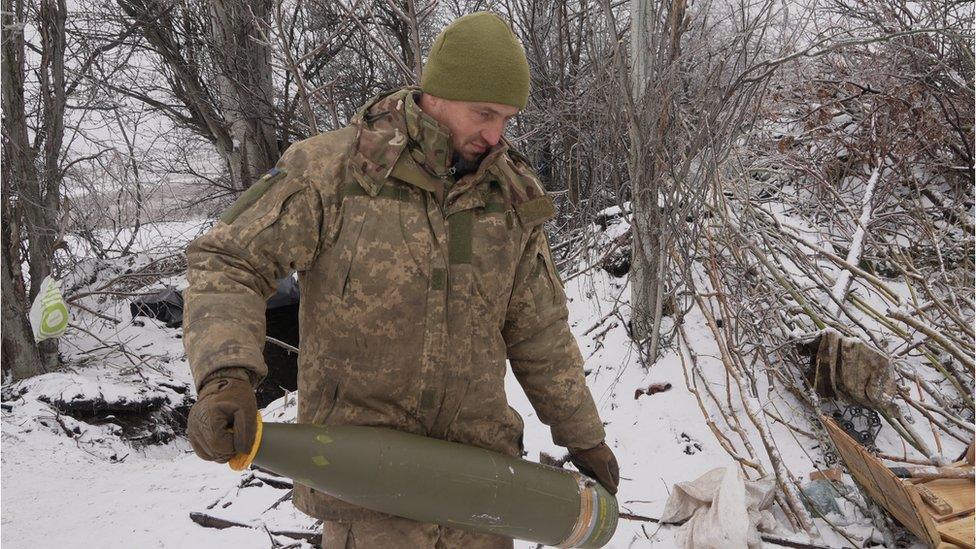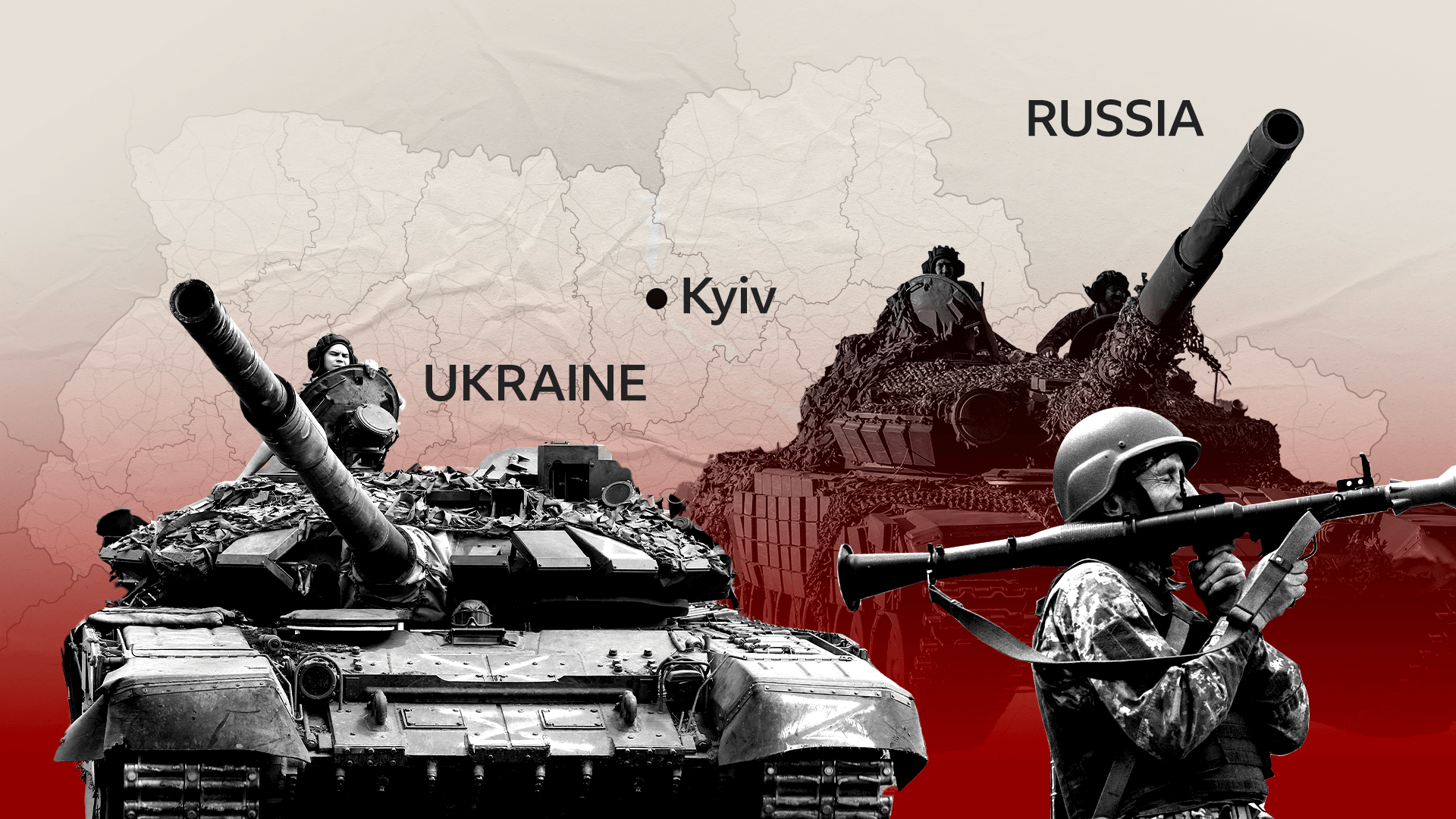Macron says Russian defeat in Ukraine vital for security in Europe
- Published
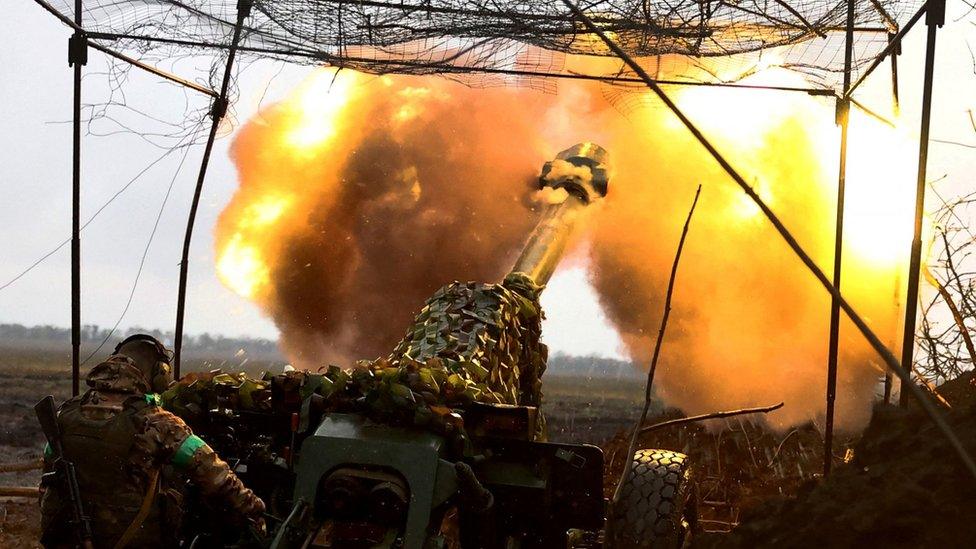
Ukraine says its forces are currently outgunned by Russian troops, asking allies for urgent weapons supplies
French President Emmanuel Macron has said it is key for Europe's security to defeat Russia in Ukraine, amid urgent pleas for more weapons from Kyiv.
He was speaking in Paris where he said that European leaders had agreed to set up a coalition to give Ukraine medium- and long-range missiles and bombs.
He added that there was "no consensus" on sending Western troops to Ukraine, but that "nothing should be excluded".
Russian troops have recently made gains in Ukraine which faces arms shortages.
Kyiv is critically dependent on modern armoury supplies from its Western allies, particularly the US, to be able to continue fighting Russia - a far bigger military force with an abundance of artillery ammunition.
But the approval of a much needed $95bn (£75bn) US aid package - including $61bn for Ukraine - faces an uphill battle in the House of Representatives.
Last weekend, Ukraine's defence minister said half of all Western aid for Kyiv had been delayed, costing lives and territory.
In response to Mr Macron, a spokesperson for UK Prime Minister Rishi Sunak said his government had no plans for a large-scale military deployment to Ukraine, beyond the small number of personnel already training Ukrainian forces.
Germany, Sweden, Poland and the Czech Republic have also ruled out such suggestions.
On Friday, Hungary blocked a statement sent to EU member countries by the European Council President Charles Michel, pledging "unwavering" support for Ukraine.
Prime Minister Viktor Orban - the only EU leader who maintains warm relations with Russia's President Vladimir Putin - has been repeatedly at odds with the bloc over measures to help Kyiv since Russia's invasion.
On Tuesday, Hungary's foreign minister reiterated that Budapest is not willing to send weapons or troops to Ukraine.
Peter Szijjarto said: "The war in Ukraine must be finished, not expanded."
Kremlin spokesperson Dmitry Peskov called Mr Macron's suggestion "a very important new element" adding it was absolutely not in the interests of Nato members.
"In that case, we would need to talk not about the probability, but about the inevitability [of direct conflict]", said Mr Peskov.
Earlier, Nato secretary general Jens Stoltenberg denied considering whether troops would be sent to Ukraine, although he insisted the alliance would continue to support Kyiv strongly.
As Kyiv struggles to secure more aid and weapons to continue fighting Russia, the Kremlin's need for extra ammunition has reportedly taken it to an unlikely player in this war.
South Korea says that North Korea has shipped as many as three million shells to Russia, for use in its war in Ukraine. Its defence minister, Shin Won-sik, said that in return, Moscow had sent thousands of containers of food.
Both Moscow and Pyongyang deny North Korea is supplying Russia with munitions.
A full-scale invasion of Ukraine launched by Russian President Vladimir Putin is now in its third year, with no signs that the biggest war in Europe since World War Two could end soon.
Monday's crisis meeting in support of Ukraine was attended by heads of European states, including German Chancellor Olaf Scholz, and top government officials like UK Foreign Secretary David Cameron.
Delegations from the US and Canada were also present.
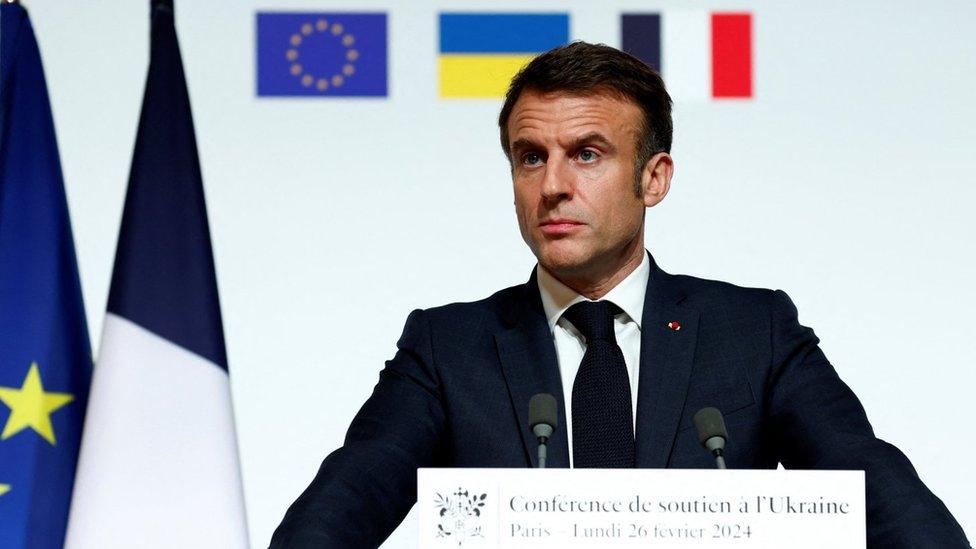
Emmanuel Macron: "Russia cannot, must not win this war"
President Macron said: "We are convinced that the defeat of Russia is indispensable to security and stability in Europe."
Describing Russia as the "sole aggressor", he said, "We are not at war with the Russian people. We just don't want to let them win.".
Mr Macron announced that a coalition would provide Ukraine with "missiles and bombs of medium and long range to carry out deep strikes". He did not say when such weapons would be delivered.
And he did not rule out sending Western ground troops to Ukraine but acknowledged that differences remained among the allies.
"There was no consensus today to send troops on to the ground in an manner that's official, assumed and endorsed," he said. "But on the dynamic, nothing should be excluded. We will do everything so that Russia cannot win this war."
"We should not exclude that there might be a need for security that then justifies some elements of deployment," he added. "But I've told you very clearly what France maintains as its position, which is a strategic ambiguity that I stand by."
Czech Prime Minister Petr Fiala earlier said his country had no intention of deploying its forces to fight in Ukraine.
He was reacting to comments by his Slovak counterpart Robert Fico, who was quoted by Reuters news agency as saying: "I can confirm there are countries that are prepared to send their own troops to Ukraine, there are countries that say never, among which Slovakia belongs, and there are countries that say this proposal needs to be considered."
Ukrainian President Volodymyr Zelensky, who also took part in Monday's meeting by video link, said that "everything we do together to defend against Russian aggression adds real security to our nations for decades to come".
Russia has repeatedly warned that any Western troop deployment in Ukraine would trigger a direct conflict between Moscow and the Nato military alliance.

- Published25 February 2024
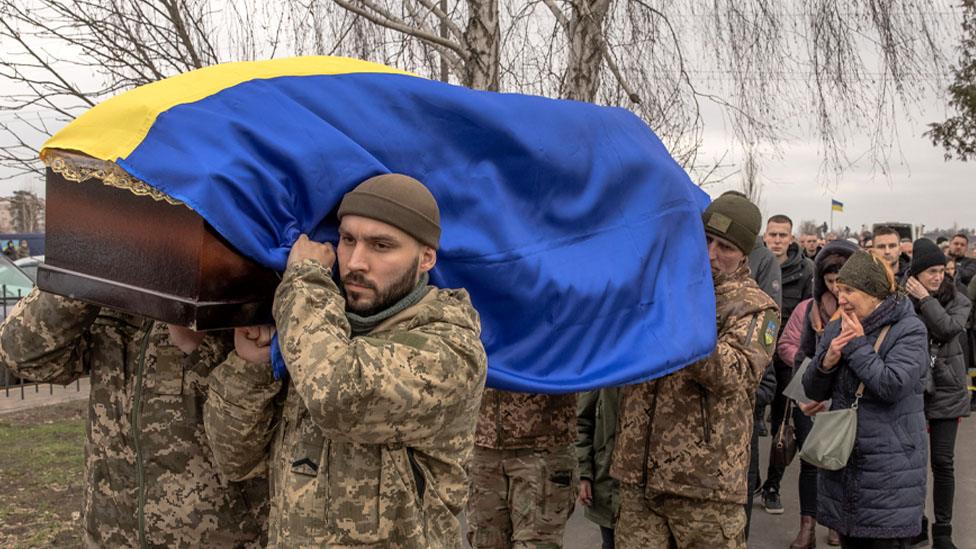
- Published24 February 2024
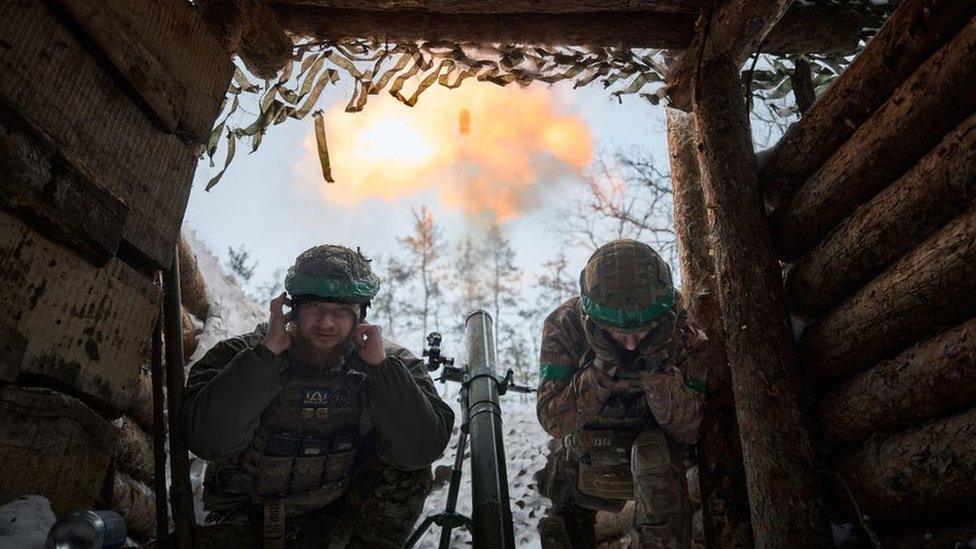
- Published24 February 2024
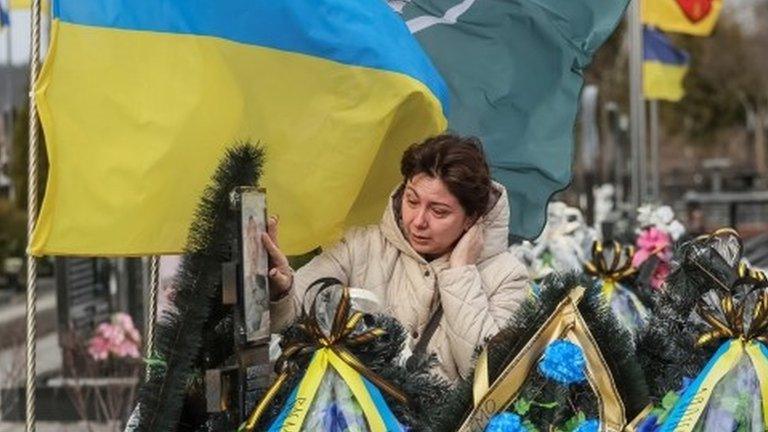
- Published22 February 2024
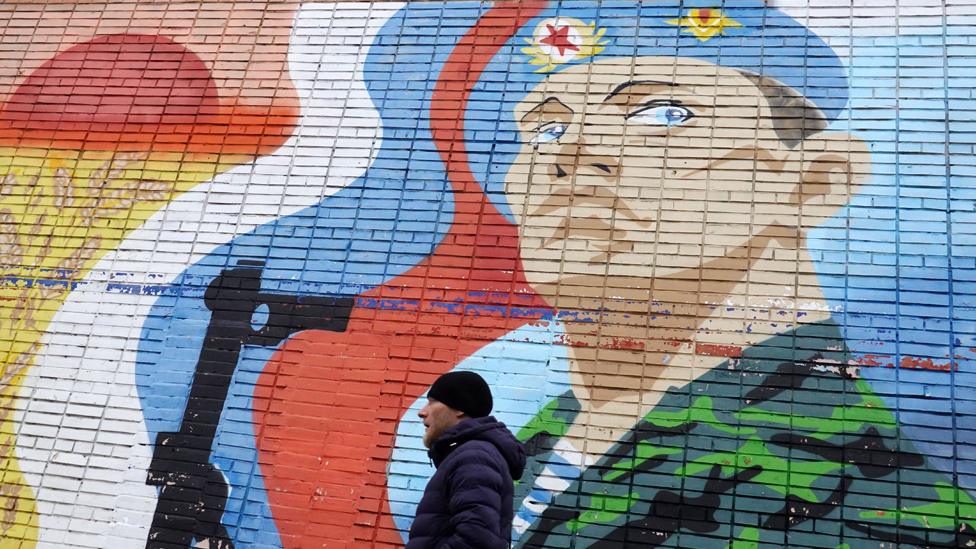
- Published18 February 2024
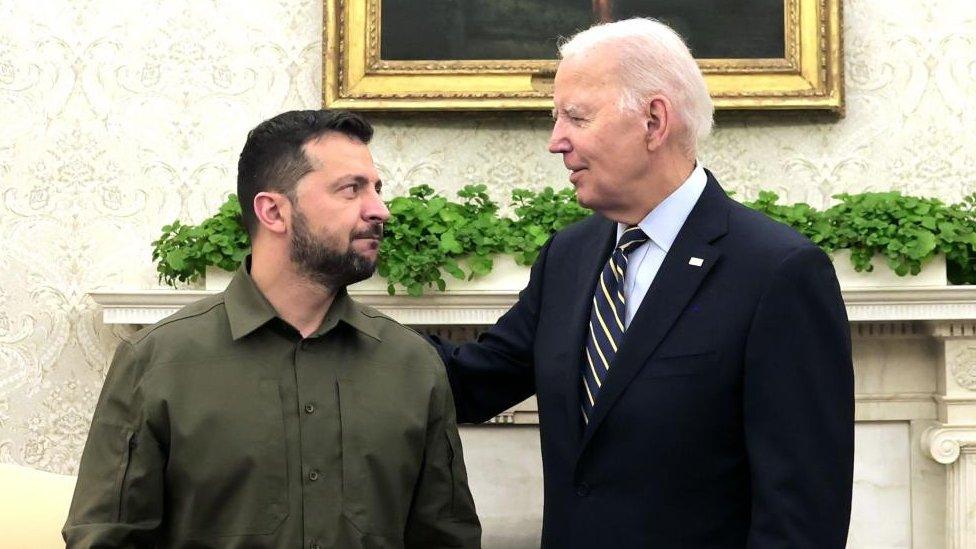
- Published14 December 2023
